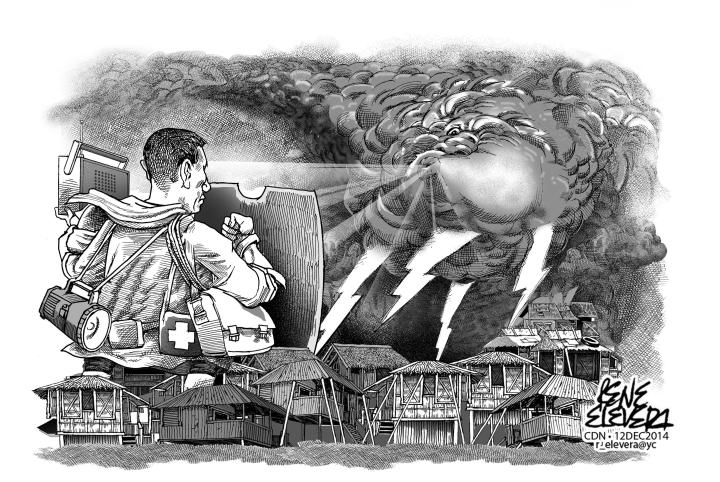Although there were a few hitches, early warning and early response to typhoon Ruby (international name: Hagupit) made the difference.
The National Disaster Risk Reduction Management Council (NDRRMC) yesterday placed the total storm damage in the country at P3 billion. Of this amount , P1.277 was in terms of infrastructure while P1.912 billion was in agriculture.
But the biggest achievement was in terms of saved lives. Depending on who’s counting, the death toll in Ruby was 18 to 23 compared to over 7,000 deaths in Yolanda.
Aside from the Yolanda factor, science and political leadership mattered most in the early warning and early response.
The state weather bureau Pagasa made accurate and timely forecasts of the storm track, its wind strength, rainfall and ground speed.
The tracking of Ruby by Pagasa and the Japan Meteorological Agency were spot on.
Political leadership was also key. President Aquino stayed visible this time, front and center.
He convened and presided over the national disaster council meeting on Dec. 5, two days before Ruby made landfall. The president gave clear instructions to evacuate those in harm’s way.
Interior Secretary Mar Roxas was in Eastern Visayas ahead of Ruby’s landfall. Except for the viral photo of his motorcycle ride and slip sans crash helmet, Roxas was well grounded and apparently redeemed himself from last year’s sorry experience that saw him and Defense Secretary Voltaire Gasmin marooned in Tacloban City.
The local government units, which are the first responders, did not hesitate to undertake preemptive evacuations. Mayor Mike Rama of Cebu City and Cebu Gov. Hilario Davide III ordered those in danger zones evacuated as early as Friday. The people, wiser after Yolanda, cooperated with little complaint.
Last Saturday was actually a period of waiting and tying loose ends in the evacuation centers. When Ruby’s fierce winds and torrential rains came, people were safe.
It can’t be helped that some skeptics sneered at the early response as an overkill. But the mocking turned out unfounded.
With the right science, early warning systems are not excerises of the “boy who cried wolf”.
Now that the skies have cleared, we know better. ‘Zero casualty’ is doable and the goal that matters most.
